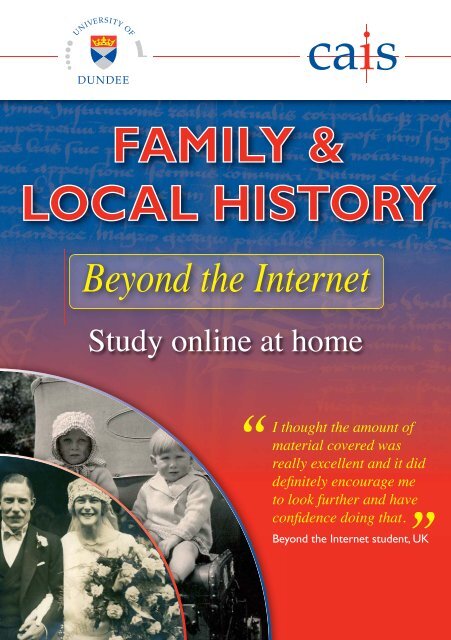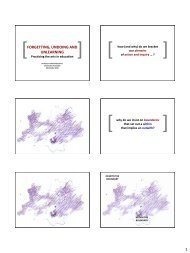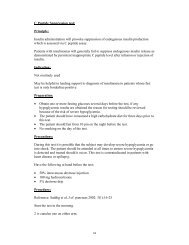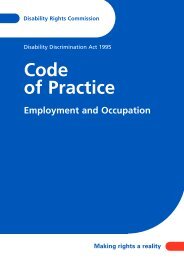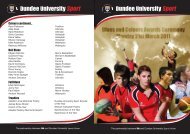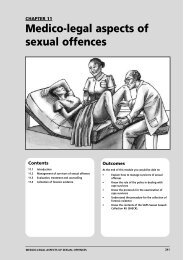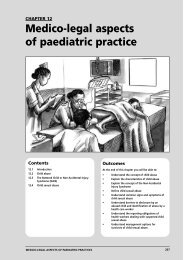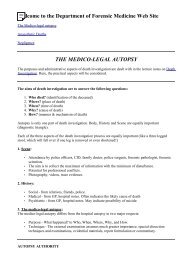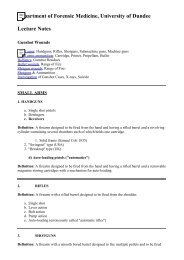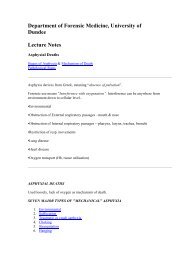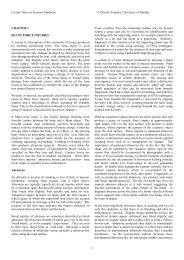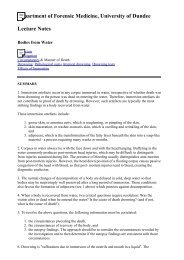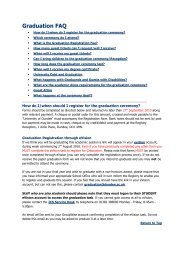Download the Course Brochure - University of Dundee
Download the Course Brochure - University of Dundee
Download the Course Brochure - University of Dundee
Create successful ePaper yourself
Turn your PDF publications into a flip-book with our unique Google optimized e-Paper software.
Beyond <strong>the</strong> Internet<br />
Study online at home<br />
I thought <strong>the</strong> amount <strong>of</strong><br />
material covered was<br />
really excellent and it did<br />
defi nitely encourage me<br />
to look fur<strong>the</strong>r and have<br />
confi dence doing that.<br />
Beyond <strong>the</strong> Internet student, UK
What is Beyond <strong>the</strong> Internet?<br />
Beyond <strong>the</strong> Internet comprises two six week courses in family and local history.<br />
They will give you <strong>the</strong> skills to develop your research and provide more details<br />
about how your ancestors lived <strong>the</strong>ir lives. They are aimed at those who are<br />
interested in expanding <strong>the</strong>ir skills and knowledge in a relatively short period<br />
<strong>of</strong> time.<br />
• Are you interested in fi nding out more about your family or local history?<br />
• Have you looked at some <strong>of</strong> <strong>the</strong> online websites, sources and indexes that are<br />
available but want to know where to go next?<br />
• Do you want to start using original sources and records but are not sure how<br />
to go about this?<br />
• Would you like to know more about <strong>the</strong> historical context in which your<br />
ancestors lived?<br />
The courses are online, easy to use and fully supported. You can<br />
do <strong>the</strong>m wherever you live and can log onto <strong>the</strong> site at<br />
whatever time you wish to study. You will work your<br />
way through <strong>the</strong> courses with o<strong>the</strong>r students and<br />
will be able to discuss <strong>the</strong> topics on a discussion<br />
forum. Your tutor will provide support and<br />
guidance throughout.<br />
If you want to go fur<strong>the</strong>r with your<br />
family and local history research<br />
and to learn in a supportive,<br />
enjoyable and interactive<br />
environment, <strong>the</strong>se courses<br />
are for you.
Key Features<br />
• Online fully supported distance learning<br />
• Introductory and advanced courses, each lasting six weeks<br />
• Expert tutors who are pr<strong>of</strong>essional archivists and experienced genealogists<br />
• A range <strong>of</strong> exciting records, not just registers and census data<br />
• A discussion forum to exchange views and information<br />
• Online tasks to aid self study and reinforce learning<br />
All students will receive a Certifi cate <strong>of</strong> Completion from <strong>the</strong> <strong>University</strong> <strong>of</strong> <strong>Dundee</strong>.<br />
Apply online at: www.dundee.ac.uk/cais/beyond<strong>the</strong>internet.htm<br />
<strong>Course</strong> Content<br />
Beyond <strong>the</strong> Internet 1:<br />
• Introduction and key records (birth, marriage, death registers and <strong>the</strong> census)<br />
• Church records<br />
• Wills and testaments<br />
• Poor law records<br />
• Military records<br />
• Palaeography<br />
Beyond <strong>the</strong> Internet 2:<br />
• Civil and criminal courts and police force records<br />
• Education records<br />
• Church court records<br />
• Manorial records and estate papers<br />
• Title deeds, maps and plans<br />
• Emigration, burgesses and apprentices and printed materials<br />
On completion <strong>of</strong> Beyond <strong>the</strong> Internet you might be interested in taking your studies<br />
fur<strong>the</strong>r with <strong>the</strong> Postgraduate Certifi cate in Family & Local History. More information<br />
is available from <strong>the</strong> CAIS website and from your tutor.
Beyond <strong>the</strong> Internet 1<br />
Introduction and key records: this unit will build on your existing knowledge<br />
<strong>of</strong> <strong>the</strong> core sources with which all family and local historians should be familiar. It<br />
will explain what information can – and, more importantly, cannot - be gained from<br />
<strong>the</strong> civil registration records: <strong>the</strong> indexes <strong>of</strong> birth, marriage and death registers,<br />
along with associated records such as those relating to adoption. Websites<br />
allowing access to <strong>the</strong> indexes tend to minimise <strong>the</strong> diffi culties involved in fi nding<br />
information from this source. The background to <strong>the</strong> decennial census will be<br />
discussed and <strong>the</strong> various pitfalls explained. Programmes such as ‘Who do you think<br />
you are?’ do not make it clear that <strong>the</strong> census, although a wonderful source, has a<br />
number <strong>of</strong> defi ciencies. The rest <strong>of</strong> <strong>the</strong> module will point you to sources that can<br />
make up for this.<br />
Church records: records <strong>of</strong> baptisms, marriages and burials (not births, marriages<br />
and deaths) can be found as early as 1538 although it is rare for <strong>the</strong>m to survive<br />
in an unbroken series from this date for any given parish. The earliest<br />
records relate to <strong>the</strong> established churches in <strong>the</strong> UK as,<br />
although some nonconformist denominations existed from<br />
as early as <strong>the</strong> 16 th century <strong>the</strong>y <strong>of</strong>ten worshipped<br />
in secret and <strong>the</strong>re was no requirement for<br />
<strong>the</strong>m to keep records. The Disruption <strong>of</strong><br />
1843 in Scotland, when many Church<br />
<strong>of</strong> Scotland ministers left <strong>the</strong> Church<br />
and established new denominations,<br />
impacted on <strong>the</strong> records produced.<br />
Someone once summed up<br />
many <strong>of</strong> <strong>the</strong> frustrations felt by<br />
family historians – ‘nomadic<br />
nonconformist’ and <strong>the</strong>re will<br />
be few people who have not<br />
encountered this problem!
Wills and testaments: Wills and Inventories are among some <strong>of</strong> <strong>the</strong> most<br />
interesting documents a family or local historian will encounter and provide a<br />
wonderful picture <strong>of</strong> <strong>the</strong> lives <strong>of</strong> our forbears. O<strong>the</strong>r similar documents include<br />
letters <strong>of</strong> administration and probate accounts. Increasingly, access to <strong>the</strong>se are<br />
available online, for example, over 600,000 <strong>of</strong> Scotland’s wills and testaments have<br />
been indexed and digitised.<br />
Old and new poor laws: <strong>the</strong> system <strong>of</strong> poor relief can provide some <strong>of</strong> <strong>the</strong> most<br />
fascinating and poignant documents for a study <strong>of</strong> <strong>the</strong> past. The ‘old’ and ‘new’ poor<br />
laws in Scotland and England generated one <strong>of</strong> <strong>the</strong> best sources most family and<br />
local historians will use. Documents such as poor law applications and poorhouse<br />
and workhouse admission and discharge registers are gems which – while <strong>the</strong>y do<br />
not survive as well as one might wish – give unrivalled information.<br />
Military records: before <strong>the</strong> First World War few <strong>of</strong> us will have had ancestors<br />
who fought for <strong>the</strong>ir country, but <strong>the</strong> Great War involved thousands <strong>of</strong> ordinary<br />
men (and women). Although some First World War records were destroyed by<br />
enemy action in <strong>the</strong> Second World War, <strong>the</strong> personal fi les <strong>of</strong> many combatants<br />
survive in The National Archives and are being made available online.<br />
Institutions such as regimental museums are also good sources<br />
<strong>of</strong> information.<br />
Palaeography: before very long, and certainly<br />
as you go back to <strong>the</strong> 18 th century and earlier,<br />
you will need some help in reading <strong>the</strong><br />
documents! Styles <strong>of</strong> writing such as<br />
<strong>the</strong> elegant ‘Secretary Hand’ are<br />
actually much easier to read than<br />
something written now, but<br />
students will have to learn <strong>the</strong><br />
‘code’ in order to understand<br />
<strong>the</strong>m. Palaeography is a skill<br />
that most people learn<br />
easily, and in which <strong>the</strong>y<br />
take great pride.
Beyond <strong>the</strong> Internet 2<br />
Civil and criminal courts and police forces: <strong>the</strong>se can be key records for <strong>the</strong><br />
family historian even if your ancestor, wherever <strong>the</strong>y were in <strong>the</strong> UK, wasn’t a criminal.<br />
In England and Wales, <strong>the</strong> only form <strong>of</strong> ‘local government’ before <strong>the</strong> advent <strong>of</strong> county<br />
councils in 1889 was <strong>the</strong> Court <strong>of</strong> Quarter Sessions. Although it was primarily a body<br />
set up to deal with criminal <strong>of</strong>fences, <strong>the</strong> fact that it existed in every corner <strong>of</strong> <strong>the</strong> land<br />
meant that it became <strong>the</strong> body used to administer state business. The records <strong>of</strong> <strong>the</strong><br />
court can be wide-ranging and extensive, although like many o<strong>the</strong>r sources <strong>the</strong> picture<br />
varies from area to area; <strong>the</strong>y include alehouse recognizance registers (for those<br />
ancestors who kept a pub), lists <strong>of</strong> pauper lunatics, Land Tax returns and much much<br />
more. In Scotland sheriff courts had similar responsibilities and we look at <strong>the</strong> wealth<br />
<strong>of</strong> material in <strong>the</strong>se records as well as sources relating to <strong>the</strong> police force.<br />
Education: most <strong>of</strong> our ancestors did not receive any sort <strong>of</strong> education much before<br />
<strong>the</strong> 19 th century, although <strong>the</strong>re were exceptions like <strong>the</strong> major public schools and<br />
some church provision. It seems hard to believe that <strong>the</strong> behemoth <strong>of</strong> <strong>the</strong> modern<br />
education system has only been in existence for just over 100 years.<br />
Records such as log books provide a marvellous picture not just <strong>of</strong><br />
<strong>the</strong> school but <strong>of</strong>ten <strong>of</strong> <strong>the</strong> wider community.<br />
Church court records: church courts dealt with<br />
‘moral’ <strong>of</strong>fences, as well as probate. These include<br />
such <strong>of</strong>fences as non-attendance at church as<br />
well as sexual peccadilloes. People who chose<br />
to marry by special licence, ra<strong>the</strong>r than by<br />
having <strong>the</strong>ir banns read, required a bond<br />
and allegation and <strong>the</strong>se documents<br />
provide more information than <strong>the</strong><br />
record <strong>of</strong> <strong>the</strong> marriage.
Manorial records and estate papers: before <strong>the</strong> modern period many<br />
people’s lives were regulated by <strong>the</strong> manor and <strong>the</strong> records generated can be very<br />
informative. Although mainly dealing with land holding, items such as court records<br />
can shine a light on a long-forgotten system <strong>of</strong> farming. Individuals may feature<br />
in <strong>the</strong> court registers or in documents such as admittances and surrenders. In<br />
Scotland estate papers are a major source for genealogists and local historians.<br />
Title deeds, maps and plans: <strong>the</strong>se <strong>of</strong>ten represent <strong>the</strong> largest percentage<br />
<strong>of</strong> material in a record <strong>of</strong>fi ce and, until <strong>the</strong> system was simplifi ed in <strong>the</strong> early<br />
20 th century, can be very complex. The transfer <strong>of</strong> property <strong>of</strong>ten took <strong>the</strong> form<br />
<strong>of</strong> a fi ctitious legal action to provide a greater degree <strong>of</strong> protection for <strong>the</strong> vendor<br />
and purchaser. Although few <strong>of</strong> our ancestors would have held land, never<strong>the</strong>less<br />
<strong>the</strong>se documents can be very valuable, especially at a period when little else<br />
survives. Great Britain has a long and distinguished history <strong>of</strong> producing accurate<br />
maps, especially since <strong>the</strong> Ordnance Survey was formed in 1791. Early maps<br />
were more ‘representational’ and can <strong>of</strong>ten be works <strong>of</strong> art. This unit will look<br />
at estate maps, enclosure and ti<strong>the</strong> records and maps and plans connected with<br />
public utilities.<br />
Emigration, burgesses and apprentices and printed<br />
material: many individuals and families emigrated<br />
from <strong>the</strong> UK or came to <strong>the</strong> UK from o<strong>the</strong>r<br />
countries. The Highland Clearances <strong>of</strong> <strong>the</strong><br />
19 th century are one <strong>of</strong> <strong>the</strong> most famous<br />
examples <strong>of</strong> this trend. One <strong>of</strong> <strong>the</strong> key<br />
sources for researching emigration<br />
are passenger lists. This unit will<br />
look at <strong>the</strong>se and o<strong>the</strong>r registers<br />
or printed sources which may<br />
mention your ancestors such<br />
as burgess and apprenticeship<br />
lists, local directories and<br />
newspapers.
Being able to take a program<br />
like this when one lives<br />
thousands <strong>of</strong> miles away<br />
from <strong>the</strong> school and fellow<br />
classmates is an incredible<br />
feeling. I have really enjoyed<br />
my time at <strong>Dundee</strong>.<br />
Beyond <strong>the</strong> Internet student, USA<br />
To book your course,<br />
contact us now at:<br />
Centre for Archive and<br />
Information Studies<br />
<strong>University</strong> <strong>of</strong> <strong>Dundee</strong>, <strong>Dundee</strong>, DD1 4HN, Scotland UK<br />
t: 01382 385543 f: 01382 385523<br />
e: armtraining@dundee.ac.uk<br />
www.dundee.ac.uk/cais


